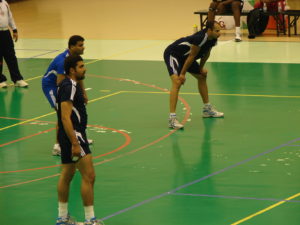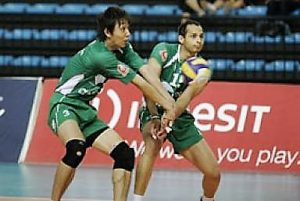I am not a lawyer but common sense tells me that, if I’m defending a case in front of a judge, If I have enough evidence to win the case, I will be way more confident as if I don’t have many or if the ones I have aren’t strong enough to fight the case.
I will argue that in the event I am a lawyer, and I have to fight a case, if I don’t have enough, strong evidence, I don’t need to have Ph.D. in-laws to try to persuade my client to negotiate with the counter par, or maybe advise him to confess it’s faulty so he can earn a lighter condemn…
Let’s translate this to volleyball to help you make my point with this definitely non-volleyball-friendly title – I’m sure it sparked your curiosity.
Let’s say you are playing at the highest level you ever imagined you would play. That might mean to you playing the Gold medal game at the Olympics, the championship game in a pro league, a DI college championship game, a Gold medal Junior Olympics National tournament, or the school State Championship game.
In those types of games, I don’t care how well you and your team are prepared – technically, physically, tactically, mentally, you will always have to defend a case, and to do that, you need evidence.
What does have evidence looks like?
Evidence is not confidence. Evidence is not assurance of not having struggles or stress when playing an important game. Having evidence mean being prepared to respond physically and mentally to what the opponent present to us. Is constantly adjusting to appropriately fight every point as if it’s the last point.
The case you’re defending is the right to win that important game, your teammates, your coaches, and your family will never forget. When you’re playing high-level games, you’re going to need to have tons of strong evidence to fight against your biggest opponent.
No. It’s not the team on the other side of the net. Is not the teammate you think is envious of you. Is not the coach you think is cutting your wings. Is not the soreness you feel due to the work accumulation.
It’s yourself.
Playing at the highest level means you’re playing against people with the same drive and intention to win as you. For that reason, relying on your skills, talents, and preparedness is not enough. This is just the opening. From there, it’s all about showing evidence to tell yourself you can pass that hard serve, run that quick offense, dig that hard attack, kill the ball in transition.
When you are playing such high-level, high-intensity games. You need a superior level of attention to detail because every point counts. And, because everything counts, to win a game, you need a lot of evidence.
Winning hig-level games is winning an internal battle
During high-level games, you’re fighting a case against yourself. It’s an internal dialog between what you believe you’re capable of doing, and what you can actually do. That’s why evidence it’s so important.
The part of you that tells you you’re not capable of doing something on the court (digging a hard attack, hitting against big blocks, passing over 2, connecting with your hitters), uses the best soldier available to take care of this critical task. This soldier is called impostor syndrome.
The impostor syndrome is the constant voice that tells you you’re not capable of passing good, hitting line, setting a slide, digging a hard shot.
The reason why impostor syndrome constantly operates it’s because every point is a battle – physical and mental. Its purpose is to remind you that you’re not capable or worthy of winning these types of games.
Does this mean high performers don’t suffer from impostor syndrome? Nope.
We all face it. Also the team on the other side of the net. Even though this is a psychological pattern, Impostor Syndrome dwells on the environment – in this case, a high-level game in an important arena. If you’re playing for fun with your friends on a Friday night, you won’t have to face this sophisticated soldier.
The only way you can fight and win the internal battle between the part of you that aspire to win, and the part that constantly reminds you you’re not capable or worthy of winning is by having strong evidence.
How much evidence is needed and where can I find it?
As many as you can.
Competitive experience is the first and richest source of evidence. Athletes that have played in an important arena have a great advantage over those that haven’t.
That’s the main reason Lebron James has won 4 NBA titles with three different teams – regardless of the team he goes. He knows he’s capable of leading a team to the glory. He’s able to change the culture in every place he goes because he knows he’s capable of winning championships and he believes he deserves to win. But most importantly, he has the evidence to win.
Besides his incredible talent, it’s well known how much time, effort, and money he spends building evidence. He spends over a million dollars a year taking care of his body. Yes, more than $1,000,000 a year. That’s why he’s so valuable to each team he plays.
But, because the rest of us aren’t Lebron James, we must work harder individually and as a team to build the evidence that will make us win the important games.
Team culture is the most profitable way of building evidence. It’s the story each individual (athlete and coaches) tells to each other. A strong team culture makes players believe they have the talent, experience, and skills to win important games.
Acknowledging this is huge. It makes a team practice with purpose. It makes players show selflessness, generosity, and high levels of maturity. It makes players successfully cope with the impostor syndrome every single point.
Not having strong evidence is risky. Each athlete and coach has its quote of responsibility for building a strong team culture so that the team can build the necessary evidence to win a high-level high-stress game. If athletes and coaches cut corners on practice, don’t challenge each other, and don’t practice intentionally. If they don’t hold each other accountable, it’ll be hard to fight the internal battle each player and coach has to face every single point.



